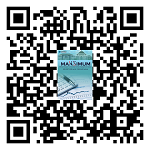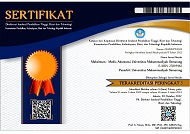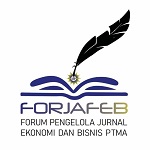Does Capital Structure, Audit Quality, and Company Profitability Have an Impact on Accounting Conservatism?
(1) Universitas Siber Asia
(2) Alma Ata University
(3) Gadjah Mada University
(4) Alma Ata University
(5) IAIN Syekh Nurjati, Ceribon, Indonesia
(*) Corresponding Author
Abstract
This study examines several factors that influence accounting conservatism: Capital Structure, Audit Quality, and Company Profitability. This study uses quantitative methods. All the manufacturing businesses included in this study are listed on the Indonesia Stock Exchange. Purposive sampling is the foundation of the sample selection technique. Panel regression, an analytical technique combining cross-sectional and time-series data, was employed in this study. The results showed that the capital structure variable did not affect accounting conservatism. Then, the audit quality variable significantly affects accounting conservatism, and the company's profitability variable does not affect accounting conservatism
Keywords
Full Text:
PDFReferences
Ainiyah, G. Z., & Sinta, I. (2019). Struktur modal dan ukuran perusahaan terhadap nilai perusahaan dengan corporate social responsibility (csr) sebagai variabel intervening pada perusahaan manufaktur sektor makanan dan minuman yang terdaftar di BEI periode 2014-2017. Medikonis, 19(1), 73–87.
Alves, S. (2020). Ownership Structure and Accounting Conservatism: Evidence From Portuguese and Spanish Listed Companies. Academy of Accounting and Financial Studies Journal, 24(6), 1–21.
Anagnostopoulou, S. C., Tsekrekos, A. E., & Voulgaris, G. (2020). Accounting conservatism and corporate social responsibility. British Accounting Review, xxxx, 100942. https://doi.org/10.1016/j.bar.2020.100942
Bajaj, Y., Kashiramka, S., & Singh, S. (2020). Application of capital structure theories: a systematic review. Journal of Advances in Management Research, 18(2), 173–199. https://doi.org/10.1108/JAMR-01-2020-0017
Caroline, H. I., Minarso, B., & Nurcahyono, N. (2023). Determinan Opini Audit Going Concern : Studi Kasus Perusahaan Sektor Industri Barang Konsumsi. Reviu Akuntansi Dan Bisnis Indonesia, 7(1). https://doi.org/10.18196/rabin.v7i1.17082
El-Habashy, H. A. K. (2019). The effect of corporate governance attributes on accounting conservatism in Egypt. Academy of Accounting and Financial Studies Journal, 23(3).
Ermawati, D., Nurcahyono, N., Sari, D. N., & Fakhruddin, I. (2023). The Dynamic Impact of Intellectual Capital on Firm Value : Evidence from Indonesia. International Conference on Business, Accounting, Banking, and Economics, 1, 246–262. https://doi.org/10.2991/978-94-6463-154-8
Evia, Z., Santoso, R. E. Wi., & Nurcahyono, N. (2022). Pengalaman Kerja, Independensi, Integritas, Kompetensi dan Pengaruhnya terhadap Kualitas Audit. Jurnal Akuntansi Dan Governance, 2(2), 141. https://doi.org/10.24853/jago.2.2.141-149
Gunawan, B., & Putra, H. C. (2021). Empirical Study of Manufacturing Companies Listed on the Indonesia Stock Exchange and Malaysia Stock Exchange Period 2017-2018. International Conference on Sustainable Innovation 2020-Accounting and Management, 176(ICoSIAMS 2020), 113–120.
Guo, J., Huang, P., & Zhang, Y. (2020). Accounting conservatism and corporate social responsibility. Advances in Accounting, 51(xxxx), 100501. https://doi.org/10.1016/j.adiac.2020.100501
Habibniya, H., Dsouza, S., Rabbani, M. R., Nawaz, N., & Demiraj, R. (2022). Impact of Capital Structure on Profitability: Panel Data Evidence of the Telecom Industry in the United States. Risks, 10(8), 1–19. https://doi.org/10.3390/risks10080157
Hejranijamil, M., Hejranijamil, A., & Shekarkhah, J. (2020). Accounting conservatism and uncertainty in business environments; using financial data of listed companies in the Tehran stock exchange. Asian Journal of Accounting Research, 5(2), 179–194. https://doi.org/10.1108/ajar-04-2020-0027
Iswanaji, C., Nafi’ Hasbi, M. Z., Salekhah, F., & Amin, M. (2021). Implementasi Analitycal Networking Process (Anp) Distribusi Zakat Terhadap Pembangunan Ekonomi Masyarakat Berkelanjutan (Study Kasus Lembaga Baznas Kabupaten Jember Jawa Timur). Jurnal Tabarru’: Islamic Banking and Finance, 4(1), 195–208. https://doi.org/10.25299/jtb.2021.vol4(1).6681
Jaimuk, P., Nilapornkul, N., & Ngudgratoke, S. (2020). Impact of a mediator on corporate governance characteristics and real earning management of Thai listed companies. Test Engineering and Management, 83(August 2021), 5912–5924. https://www.scopus.com/inward/record.uri?eid=2-s2.0-85083000162&partnerID=40&md5=2d3e3b8c33311fdaee636eba43732f44
Khalilov, A., & Osma, B. G. (2020). Accounting conservatism and the profitability of corporate insiders. Journal of Business Finance and Accounting, 47(3–4), 333–364. https://doi.org/10.1111/jbfa.12438
Kieso, D. E., Weygandt, J. J., & Warfield, T. D. (2018). Intermediate accounting: IFRS Edition, 3rd Edition. John Wiley & Sons, Inc.
Kurniawati, L., Wijayanti, R., & Kholis, N. (2021). Analisis Kesempatan Investasi dan Kebijakan Hutang terhadap Kebijakan Deviden: Studi Perusahaan LQ45. Maksimum: Media Akuntansi Universitas Muhammadiyah Semarang, 11(2), 96. https://doi.org/10.26714/mki.11.2.2021.96-109
Laux, V., & Ray, K. (2020). Effects of accounting conservatism on investment efficiency and innovation. Journal of Accounting and Economics, 70(1), 101319. https://doi.org/10.1016/j.jacceco.2020.101319
M.Zidny Nafi’ Hasbi. (2021). Portrait Of Economic Life In The Age Of The Prophet. Al-Mutsla : Jurnal Ilmu-Ilmu Keislaman Dan Kemasyarakatan, 3(1), 1–8.
Maduma, T., & Naibaho, E. A. B. (2022). Effect of Tax Avoidance, Leverage, and Profitability on Firm Value with Dividend Policy as a Moderating Variable. Jurnal Akuntansi Dan Pajak, 23(2), 1–20.
Mardones, J. G., & Cuneo, G. R. (2020). Capital structure and performance in Latin American companies. Economic Research-Ekonomska Istrazivanja , 33(1), 2171–2188. https://doi.org/10.1080/1331677X.2019.1697720
Martinez, L. B., Scherger, V., & Guercio, M. B. (2019). SMEs capital structure: trade-off or pecking order theory: a systematic review. Journal of Small Business and Enterprise Development, 26(1), 105–132. https://doi.org/10.1108/JSBED-12-2017-0387
Muhammad, R., Azlan Annuar, H., Taufik, M., & Nugraheni, P. (2021). The influence of the SSB’s characteristics toward Sharia compliance of Islamic banks. Cogent Business and Management, 8(1), 0–20. https://doi.org/10.1080/23311975.2021.1929033
Permatasari, M., Nurcahyono, N., Bilqis, L. K., & Nugroho, W. S. (2023). The Effect of Good Corporate Governance and Financial Ratios on Financial Distress. International Conference on Business, Accounting, Banking, and Economics, 1(1), 321–336. https://doi.org/10.2991/978-94-6463-154-8
Rahman, D., Kabir, M., & Oliver, B. (2021). Does exposure to product market competition influence insider trading profitability? Journal of Corporate Finance, 66, 101792. https://doi.org/10.1016/j.jcorpfin.2020.101792
Saidu, M., & Aifuwa, H. O. (2020). Board Characteristics and Audit Quality: The Moderating Role of Gender Diversity. SSRN Electronic Journal. https://doi.org/10.2139/ssrn.3544733
Salem, R., Usman, M., & Ezeani, E. (2021). Loan loss provisions and audit quality: Evidence from MENA Islamic and conventional banks. Quarterly Review of Economics and Finance, 79, 345–359. https://doi.org/10.1016/j.qref.2020.07.002
Sugiyanto, S., & Febrianti, F. D. (2021). The effect of green intellectual capital, conservatism, earning management, to future stock return and its implications on stock return. The Indonesian Accounting Review, 11(1), 93. https://doi.org/10.14414/tiar.v11i1.2286
Timoty, N. F. M., Nurcahyono, N., Yasaputri, K., & Jatiningsih, D. E. S. (2022). Predicting the risk of financial distress using corporate governance measures. International Conference on Business, Accounting, Banking, and Economics, 68, 228–245. https://doi.org/10.1016/j.pacfin.2020.101334
Wati, L. N., Pirzada, K., Ramdany, & Momon. (2020). Determinants of Accounting Conservatism in Politically Connected Firms. Journal of Security and Sustainability Issues, 10(1), 189–201. https://doi.org/10.9770/jssi.2020.10.1(14)
Article Metrics
Abstract view : 428 timesPDF - 5 times
DOI: https://doi.org/10.26714/mki.13.2.2023.139-151
Refbacks
- There are currently no refbacks.
-----------------------------------------------------------------------------------------------------------------------------------------------------------------------------------
 | MAKSIMUM: Media Akuntansi Universitas Muhammadiyah Semarang |
![]()
Maksimum: Media Akuntansi Universitas Muhammadiyah Semarang is licensed under a Creative Commons Attribution Attribution-NonCommercial-NoDerivatives 4.0 International License.

















